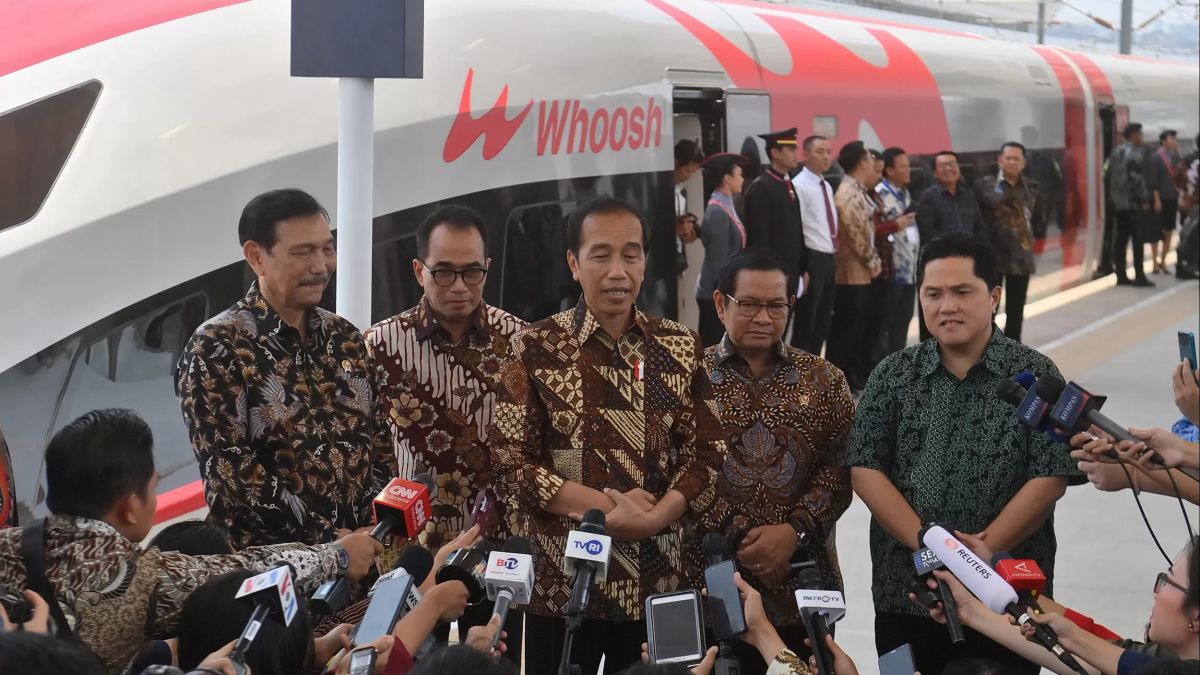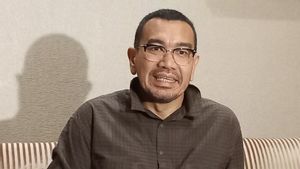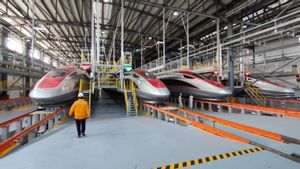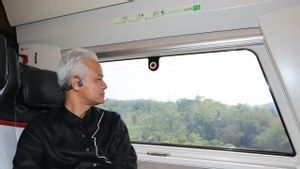JAKARTA - The Jakarta-Bandung High Speed Rail Project (KCJB), which is now named Right and has officially operated this year, has almost stalled. The construction journey was marked by pros and cons.
One of them is about the amount of costs incurred.
Citing various sources, the Fast Train project began to be studied during the era of President Susilo Bambang Yudhoyono (SBY) administration.
However, the laying of the first stone or groundbreaking was inaugurated during the era of President Joko Widodo (Jokowi) administration.
In March 2015, President Jokowi approved this project.
However, the government rejected the proposal submitted by KCJB because it explained that the source of funding for this project came from the state treasury.
Rini Soemarno as Minister of SOEs at that time, changed his decision and decided to continue the construction of this high-speed rail project in October 2015.
Then, Rini also appointed a company from China to become a colleague for the construction of this project.
KCIC Formation
On October 16, 2015, PT Kereta Cepat Indonesia China (KCIC) was founded as the company that will oversee the first high-speed rail project in Indonesia.
Reporting from the official KCIC.co.id website, KCIC is a joint venture between a consortium of State-Owned Enterprises (BUMN), which formed PT Pilar Sinergi BUMN Indonesia (PSBI), and a consortium of Chinese railway companies, through Beijing Yawan HSR Co. Ltd.
In 2016, the government decided to appoint him as one of the National Strategic Projects (PSN) in Presidential Regulation (Perpres) Number 3 of 2016. This project officially started on January 21, 2016, marked by the laying of the first stone by President Joko Widodo (Jokowi).
Project Financing
The journey of the construction of this high-speed rail project was marked by pros and cons. Especially regarding the amount of costs incurred. The reason is, the project cost which was originally estimated at IDR 86.67 trillion to IDR 114.24 trillion or swelled by IDR 27.09 trillion.
The construction of the Fast Train project was obtained from the China Development Bank (75 percent) loan fund. Meanwhile, 25 percent are shareholder capital payments, namely a combination of PT Pilar Sinergi BUMN Indonesia (PSBI) (60 percent) and Beijing Yawan HSR Co. Ltd. (40 percent).
The government also decided to guarantee debt to cover the raid on the high-speed train project. This guarantee is through the Minister of Finance Regulation (PMK) Number 89 of 2023.
Deputy Minister of State-Owned Enterprises (BUMN) Kartika Wirjoatmodjo said the guarantee here is not the APBN that guarantees the debt of the high-speed rail project. However, the government appointed PT Kereta Api Indonesia (Persero) as a KCIC shareholder to patch through PMN worth Rp3.2 trillion which he received.
However, continued Kartika, the patch funds from PMN KAI were loaned from KAI to KCIC. While the rest, KAI will borrow from the China Development Bank (CDB).
"In terms of ability to pay KAI, it's stronger. So we feel that KAI is healthy enough to make allegations for the cost overrun in the form of equity," he said at the DPR Building, Parleman Complex, Senayan, Jakarta, Wednesday, September 20.
Unstoppable Projects
The project, which was originally targeted for completion in 2019, is in fact delayed. Even so in 2021, SOE Minister Erick Thohir emphasized that this high-speed rail project would not be stopped.
Erick said that when he was appointed by President Joko Widodo (Jokowi) as Minister of SOEs, the construction of the project had been running for 60 percent.
"This is when I entered (as Minister of SOEs), the KCJB project was more than 60 percent. Should it stop? Yes, it means that if it stops, the money has caught fire. Everything has become scrap metal," he said at the Kick Andy Show, Monday, November 15, 2021.
Development To Official Progress Operates In 2023
The government continues to accelerate the construction of this high-speed rail project. From January to February 2023, the Electric Multiple Unit (EMU) series of high-speed trains began to be sent from China to Indonesia.
As of February 2023, the construction of the high-speed rail project has reached 84 percent, and the rest of the construction projects being carried out are the hardest part. The government targets this mass transportation to be operational by June 2023.
Then in May, KCIC conveyed that the overhead catenary system (OCS) or electricity flow on the Jakarta Bandung Fast Train (KCJB) began to be electrified on May 18, 2023.
The operational plan, which was originally in June, has been pushed back, and the government is targeting the fast train to resume operations in August as a gift for the Republic of Indonesia's anniversary. However, again failed and delayed to October 2023.
Ahead of operation, KCIC continues to carry out Testing & Commissioning to ensure readiness for the operation of the Fast Train.
Testing is carried out using a Comprehensive Inspection Train or Inspection Train at a speed of 180 km per hour and continues to increase its speed gradually, until it reaches its technical speed peak at 385 km per hour.
The Ministry of Transportation (Kemenhub) has issued a public railway facility operation permit for high-speed trains through the Decree of the Minister of Transportation Number KM 114 of 2023 concerning the Public Railway Facilities Operation Permit of PT Kereta Api Indonesia-China (KCIC).
SEE ALSO:
KCIC opens free trials by fast train for the community. Public enthusiasm is very high. During the three days of trials from Friday 15 September to Sunday 17 September, the Fast Train has transported 4,552 passengers either departing from Tegalluar or from Halim Perdanakusuma.
On October 2, Indonesia's dream to have a Fast Train finally came true. The mode of transportation, which was originally known as the Jakarta-Bandung High Speed Train (KCJB), is officially operational and is named
"By saying bismillahirahmanirahin, the Jakarta Bandung HIGH-speed train is in operation," said President Jokowi during the inauguration at KCJB Halim Station, Jakarta, October 2.
The English, Chinese, Japanese, Arabic, and French versions are automatically generated by the AI. So there may still be inaccuracies in translating, please always see Indonesian as our main language. (system supported by DigitalSiber.id)














